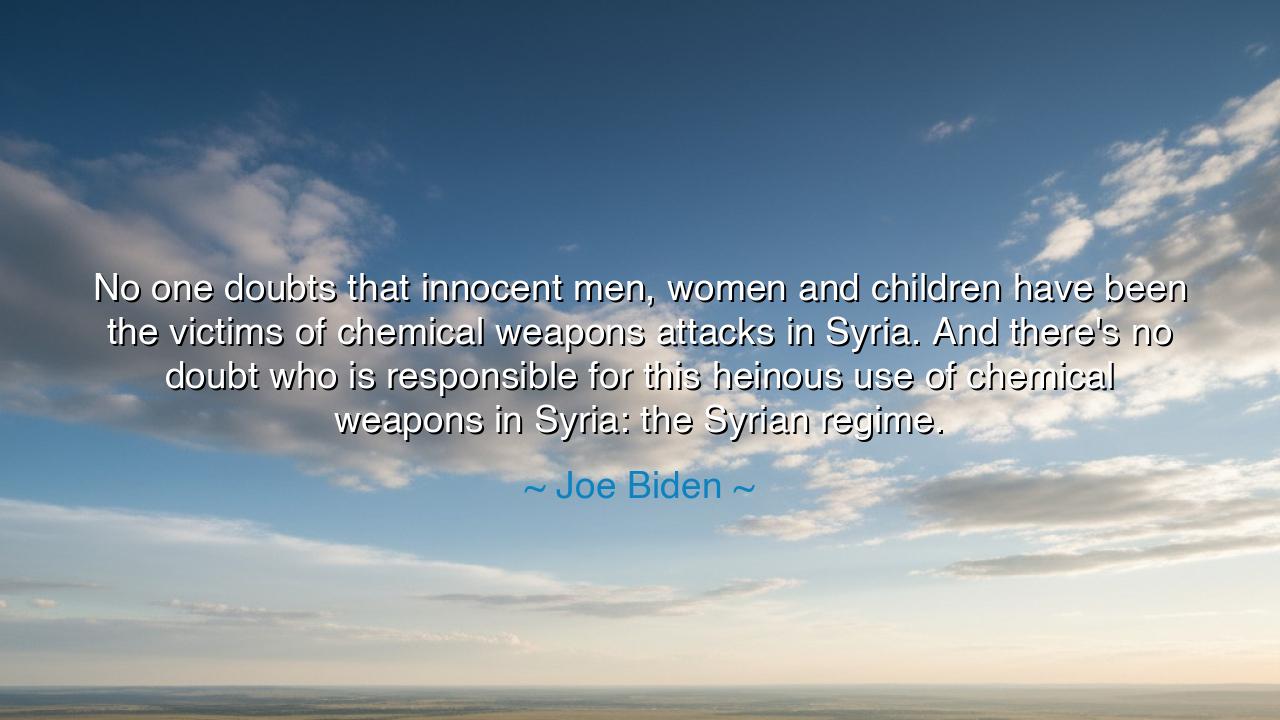
No one doubts that innocent men, women and children have been
No one doubts that innocent men, women and children have been the victims of chemical weapons attacks in Syria. And there's no doubt who is responsible for this heinous use of chemical weapons in Syria: the Syrian regime.






The words of Joe Biden — “No one doubts that innocent men, women and children have been the victims of chemical weapons attacks in Syria. And there’s no doubt who is responsible for this heinous use of chemical weapons in Syria: the Syrian regime.” — resound like a solemn judgment against cruelty. They speak of the darkest betrayal of human decency: when rulers, entrusted to guard their people, turn the weapons of death upon the innocent. His words name both the suffering and the guilt, leaving no room for denial, no veil for deception.
The meaning here is both tragic and urgent. To name the innocent victims — men, women, and children — is to remind us that war is not a matter of soldiers alone, but of broken homes, shattered lives, and generations scarred. To name the Syrian regime is to remind the world that evil thrives when responsibility is blurred. Biden speaks with the voice of one who insists that accountability is not optional: for when the most forbidden weapons are unleashed, silence itself becomes complicity.
History bears witness to the horror of such acts. In World War I, chemical weapons cloaked the trenches in clouds of poison, leaving soldiers blind, burning, and gasping for life. The world recoiled, vowing never again to permit such tools of inhumanity. Yet decades later, tyrants such as Saddam Hussein would unleash them upon villages, slaughtering civilians without mercy. Biden’s words stand in this lineage of condemnation, reminding us that though treaties were signed and laws established, the temptation of cruelty still stalks the earth.
The origin of this warning is not in politics alone, but in the ancient duty of humanity to guard the sanctity of life. When leaders betray that duty, when they slaughter the defenseless with the most insidious of weapons, they set themselves against the very order of civilization. To call such acts “heinous” is not rhetoric but truth: they are crimes that stain the conscience of the world, crimes that demand both remembrance and response.
Therefore, O seekers of justice, let these words be etched into memory: when the innocent cry out, and the guilty stand revealed, there can be no neutrality. The lesson of Syria is the lesson of all ages: that unchecked cruelty spreads like fire, and only the courage to name, to condemn, and to act can preserve the fragile fabric of humanity. Biden’s words are not only a verdict upon one regime, but a warning to every generation: that the weapons of death must never be allowed to triumph over the dignity of life.






TKThinh Kim
Biden’s statement is a clear condemnation of the Syrian regime’s use of chemical weapons, and it’s difficult to argue with his point. But I can’t help but feel frustrated by the fact that this knowledge has been out there for years now, and yet the situation hasn’t improved. What will it take to hold those in power accountable? And why is there such reluctance from global powers to intervene meaningfully in this humanitarian crisis?
NGNam Gaming
Biden's strong condemnation of the Syrian regime for the use of chemical weapons is a sobering reminder of the horrific crimes occurring in Syria. But I keep wondering—why hasn’t there been more tangible action to address this? Is the international community’s response adequate, or does it often fall short due to political interests and global power dynamics? What more can be done to prevent these atrocities from continuing without further harming innocent lives?
INIng Nhii
The reality of chemical weapons being used on innocent civilians in Syria is beyond tragic, and Biden’s statement about who is responsible is both definitive and chilling. But, at this point, what does justice look like? Should the international community be taking more direct action to stop the Syrian regime, or is this a broader issue about how global powers respond to human rights violations in general? Where do we go from here?
GDGold D.dragon
Biden’s words are powerful, and they underscore a painful truth about the Syrian conflict: the scale of human suffering. But it also raises an uncomfortable question—how do we, as the international community, stop such atrocities from continuing? Is it enough to point the finger at the Syrian regime, or does this demand a larger shift in how we handle geopolitical conflicts and prevent human rights abuses on such a scale?
GBDuong Gia Bao
Joe Biden’s statement on chemical weapons in Syria is deeply alarming. It brings to light the sheer brutality of the situation, where innocent civilians are the ones paying the price. But how much longer can the international community stand by without taking stronger action? If there’s no doubt about the regime's responsibility, why does it feel like the response has been so slow and ineffective? Shouldn’t there be a more urgent push to hold those in power accountable?